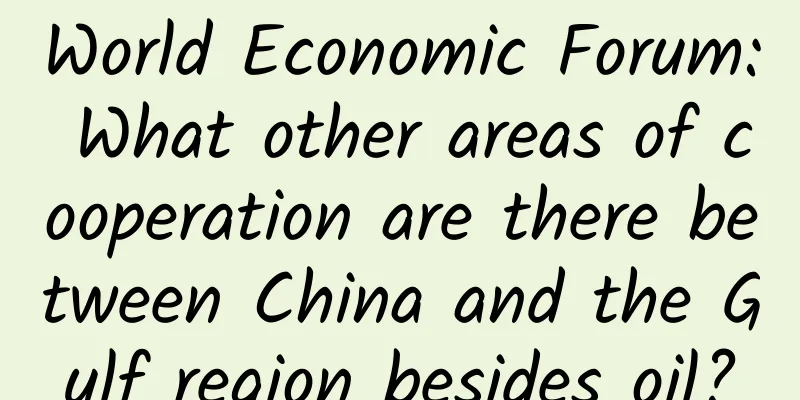World Economic Forum: What other areas of cooperation are there between China and the Gulf region besides oil?

|
Amid the changing global geopolitical landscape, the economic ties between China and the Gulf Cooperation Council (GCC) countries have significantly deepened. According to Oliver Wyman, both countries are major drivers of global economic growth, currently generating approximately 22% of global GDP. Closer ties between China and the Gulf make intuitive economic sense: China’s rapid economic growth and sharp increase in energy demand are coinciding with a surge in Gulf imports of consumer goods from China. In 2022, China’s total trade with the entire Middle East and North Africa region reached $505 billion, up 76% from 10 years ago. During the same period, China’s total trade with the Gulf countries alone tripled. At the same time, the economic ties between the two regions extend far beyond trade. In June 2023, at the World Economic Forum’s Annual Meeting of the New Champions in Tianjin, business leaders from Greater China and the GCC discussed ways to further enhance market understanding and build partnerships. They reached the following three points of consensus: In addition to energy, technology, manufacturing and gaming are also important industries in both places and provide many opportunities for cooperation. In December 2022, after Chinese President Xi Jinping visited Saudi Arabia, Saudi Arabia signed 35 memorandums of understanding with Chinese companies, most of which were related to private enterprises. One of them was signed with Chinese technology giant Huawei, covering areas such as cloud computing and the construction of high-tech complexes in Saudi cities. In the manufacturing industry, the transfer of global manufacturing centers and the “friendly shore outsourcing” plan provide opportunities for supply chain reshaping. Enovate, a Chinese emerging electric vehicle company, plans to invest $500 million in Saudi Arabia with local partners to produce electric vehicles, demonstrating the transformation of both China and Saudi Arabia into the new economic sector. At the same time, the gaming industry has become an important cross-border business opportunity, reflecting the common preferences and consumption habits of the two places. Earlier this year, Saudi Arabia's Public Investment Fund invested $265 million to purchase shares in Chinese e-sports event company Hero Sports (VSPO). In terms of energy partnerships, cooperation between China and the US is not limited to oil and gas. They are all vulnerable to the impacts of climate change and face the challenge of transformation cooperation together. For example, Dubai-based venture capital firm Mensha Ventures is working with Chinese partners to invest up to $1 billion in alternative energy in the clean technology sector. Although the initial interactions between leaders from different regions give people a sense of comfort, business leaders must strengthen their understanding of each other's markets to deepen trust. "Dialogue and trust-building mechanisms are essential to building lasting business ties," explained Alexandre Raffoul, head of corporate affairs for the Middle East and Africa at the World Economic Forum. In short, the ties between the Middle East and China are becoming closer, not just limited to the exchange of oil and consumer goods, but also the flow of technology, people, ideas and capital. The growing trend of students in the Middle East learning Mandarin, while Chinese students are also learning Arabic, is a positive start. However, a deeper understanding of the culture, traditions and business customs between the two regions is needed, which is a long and arduous task. Trade and investment require two-way interactions, and regional partnerships also require a long-term vision. "I think these interactions need to be guided by the principle of 'mutual benefit based on mutual respect,' which is a sense of promoting win-win and mutual respect for both sides," said Peter Reynolds, partner and head of Greater China at Oliver Wyman, who attended the meeting in Tianjin. He believes that business leaders need to go beyond pure commercial transaction thinking and view the relationship between the two sides as a longer-term partnership to build a deeper bond. "Only in this way can we achieve a common vision and create a win-win situation," he emphasized. The World Economic Forum is committed to providing a space for interaction and partnership between business leaders from Greater China and the Middle East. The Sustainable Development Impact Conference in New York and the Annual Meeting of the Global Future Councils in Dubai will provide opportunities for in-depth discussions on sustainable development and technology-driven transformation. These interactions ensure that all parties benefit from a strong China-Middle East Cooperation Council (China-GCC) partnership. Closer economic ties, a higher share of future global GDP, and joint investments in future technologies will have a positive impact not only in Asia and the Middle East, but also on societies around the world. |
>>: I'm shocked! Solid-state drives can be so fast
Recommend
There is formaldehyde in dishwashing liquid, can it cause cancer?
"Dishwashing liquid contains formaldehyde, w...
Alipay Ant Forest, does it have a product operation routine?
This article mainly conducts a detailed analysis ...
These 6 diseases sound scary, but they don’t need to be treated.
With the advancement of medical technology, we ar...
Kuaishou information flow advertising marketing method!
A detailed introduction to Kuaishou's informa...
Online promotion channels and methods
Here I will organize for you some free channels f...
BMW 5 Series M Performance Edition official pictures released, debut early next year
Recently, BMW released a set of official pictures...
User operation: the core operation methodology that you must know!
For a long time, people have had many opinions an...
Why can Mimi Meng be a clickbait headline reader?
As an operator of a public account , I have a lov...
Is it expensive to customize the Yichun meat and poultry mini program? Yichun meat and poultry mini program customization cost and process
What is the price for customizing Yichun meat and...
Where is the real Three-Body World? Will it be the same as described in science fiction novels?
The TV series "The Three-Body Problem" ...
After grabbing the red envelopes, did WeChat Pay win?
The red envelope craze cannot burn the future of ...
The dispute between Cainiao and SF Express has come to an end: both parties still need to cooperate, who can resist money?
Just as the public was still speculating which co...
What makes us feel sleepy and what happens if we don't sleep?
Human life is actually very short, and the best y...
It’s time to enjoy the spring, but don’t get angry!
As the weather gradually warms up, it is a good t...
SAIC-GM-Wuling personnel changes: Dai Weirui appointed as executive vice president
General Motors announced that Dai Weirui will rep...









